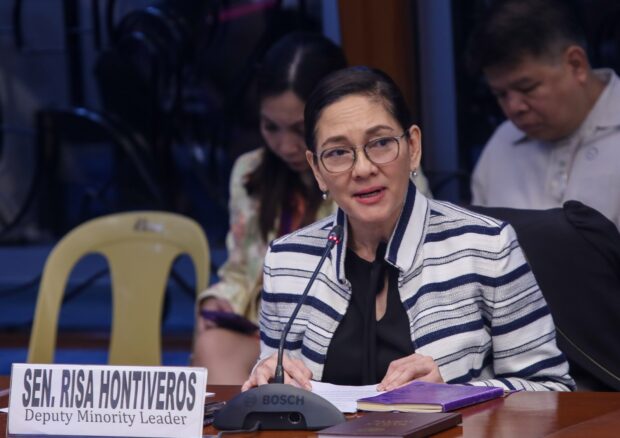
Deputy Minority Leader Risa Hontiveros during one of the Senate hearings. Senate PRIB file photo / Bibo Nueva España
MANILA, Philippines — Senator Risa Hontiveros on Monday maintained that the involvement of third parties in doing transmission projects within the energy sector may only do more harm than good.
Hontiveros made the pronouncement after President Ferdinand Marcos Jr. directed the Department of Energy (DOE) and the Energy Regulatory Commission (ERC) to study allowing third-party constructors for the country’s transmission projects.
READ: DOE, ERC told: Study allowing 3rd parties to construct transmission projects
According to the senator, involving third parties could only favor certain groups of people and not public welfare.
“Previous Senate investigations found no compelling reasons for third-party involvement, and the Executive’s proposition raises further questions. Kung hirap ang ERC at DOE ngayon na i-regulate o pasunurin ang National Grid Corporation of the Philippines (NGCP), mas gagaan at huhusay kaya ang sistema kung bubuksan ito sa third parties?” said Hontiveros in a statement.
(Considering that the ERC and the DOE currently face difficulties in regulating or overseeing the NGCP, would the system improve and become more efficient if it were opened up to third parties?)
“In fact, the call for third-party developers is painful evidence of the failed privatization of the transmission sector and the NGCP experiment,” she added.
The NGCP, for its part, attributed delays in transmission projects to right-of-way permits, but Hontiveros pointed out that this is because the power grid corporation only begins acquiring such permits after regulatory approval.
“Segurista palagi ang mga pribadong negosyo tulad ng NGCP. Hindi muna gagastusan ang pagkuha ng right of way dahil may risk na hindi matuloy ang project. The private sector’s profit-first mentality delays public service, as they prioritize returns before fulfilling their service obligations,” Hontiveros stated.
(Private businesses, such as the NGCP, are always cautious. They don’t invest in acquiring the right-of-way right away because there’s a risk that the project may not push through. The profit-first mindset of the private sector results in delays in public service, as they prioritize financial returns before fulfilling their service obligations.)
Because of this, she cited the NGCP’s case as proof that the private sector plan is “limited” and “does not address the urgent requirements for timely power grid development, security, and reliability.”
READ: NGCP not solely to blame for Visayas outage – senators
“Wouldn’t choosing another private entity repeat the same mistake? Solving one error with another is not a solution,” said Hontiveros.
Hontiveros then emphasized that the government itself is better equipped to acquire right-of-way permits, allocate funds for property ownership, and prioritize public welfare anchored on public accountability — meaning, third-party transmission developers would not effectively address the current issues with NGCP.
“The modernization of our national transmission power grid is primarily anchored on public service and ensuring public welfare, not business interest. Failed privatization policy in our power grid combined with very weak regulation will be a regular challenge in achieving an affordable and continuous electricity supply for every Filipino household,” Hontiveros said.